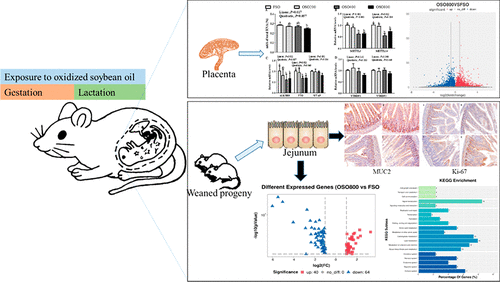当前位置:
X-MOL 学术
›
J. Agric. Food Chem.
›
论文详情
Our official English website, www.x-mol.net, welcomes your
feedback! (Note: you will need to create a separate account there.)
Maternal Oxidized Soybean Oil Administration in Rats during Pregnancy and Lactation Alters the Intestinal DNA Methylation in Offspring
Journal of Agricultural and Food Chemistry ( IF 5.7 ) Pub Date : 2022-05-12 , DOI: 10.1021/acs.jafc.2c01100 Chuanqi Wang 1 , Haoyang Sun 1 , Xu Jiang 1 , Xin Guan 1 , Feng Gao 1 , Baoming Shi 1
Journal of Agricultural and Food Chemistry ( IF 5.7 ) Pub Date : 2022-05-12 , DOI: 10.1021/acs.jafc.2c01100 Chuanqi Wang 1 , Haoyang Sun 1 , Xu Jiang 1 , Xin Guan 1 , Feng Gao 1 , Baoming Shi 1
Affiliation

|
As a food contaminant, oxidized oil or lipid oxidative products have been proven to exert toxicological effects on the growth and development of animals and humans. Research shows that maternal oxidative stress damage might transmit to another generation by epigenetic modulation. However, current evidence is still not clear on the mechanism of the effects of dietary oxidized oil during pregnancy on the two generations. This study employed a rat model fed with oxidized soybean oil (OSO) during pregnancy and lactation to explore the effects of the oxidative degree (0, 200, 400, and 800 mequiv of O2/kg) on the placental RNA methylation and DNA methylation in offspring jejunum. The results showed that following the ingestion of OSO, the placental genes of different m6A methylation were significantly enriched to nutrient metabolic processes and hormone activity. In addition, the intestine in offspring hypofunctioned observably, such as reducing the height of villi and the level of anti-inflammatory cytokine. Furthermore, maternal intake of OSO during pregnancy can damage the intestinal barrier function of offspring by inhibiting the proliferation and differentiation of intestinal epithelial cells and reducing the activity of intestinal DNA methyltransferase. In conclusion, this study reinforces the assertion that maternal OSO consumption during gestation and lactation negatively affects the placental health and intestinal development of suckling pups.
中文翻译:

妊娠期和哺乳期大鼠母体氧化大豆油给药改变后代肠道 DNA 甲基化
作为食品污染物,氧化油或脂质氧化产物已被证明对动物和人类的生长发育产生毒理学影响。研究表明,母体氧化应激损伤可能通过表观遗传调节传递给另一代人。然而,目前关于妊娠期膳食氧化油对两代人影响的机制尚不清楚。本研究采用孕期和哺乳期喂食氧化大豆油(OSO)的大鼠模型,探讨氧化程度(0、200、400和800毫当量O 2 /kg)对胎盘RNA甲基化和DNA甲基化的影响。在后代空肠。结果表明,摄入OSO后,不同m 6的胎盘基因甲基化显着丰富了营养代谢过程和激素活性。此外,后代的肠道功能明显减退,如绒毛高度降低和抗炎细胞因子水平降低。此外,孕期母体摄入OSO可通过抑制肠上皮细胞的增殖和分化,降低肠DNA甲基转移酶的活性,损害后代的肠屏障功能。总之,这项研究强化了这样一种说法,即母体在妊娠和哺乳期间消耗 OSO 会对哺乳幼崽的胎盘健康和肠道发育产生负面影响。
更新日期:2022-05-12
中文翻译:

妊娠期和哺乳期大鼠母体氧化大豆油给药改变后代肠道 DNA 甲基化
作为食品污染物,氧化油或脂质氧化产物已被证明对动物和人类的生长发育产生毒理学影响。研究表明,母体氧化应激损伤可能通过表观遗传调节传递给另一代人。然而,目前关于妊娠期膳食氧化油对两代人影响的机制尚不清楚。本研究采用孕期和哺乳期喂食氧化大豆油(OSO)的大鼠模型,探讨氧化程度(0、200、400和800毫当量O 2 /kg)对胎盘RNA甲基化和DNA甲基化的影响。在后代空肠。结果表明,摄入OSO后,不同m 6的胎盘基因甲基化显着丰富了营养代谢过程和激素活性。此外,后代的肠道功能明显减退,如绒毛高度降低和抗炎细胞因子水平降低。此外,孕期母体摄入OSO可通过抑制肠上皮细胞的增殖和分化,降低肠DNA甲基转移酶的活性,损害后代的肠屏障功能。总之,这项研究强化了这样一种说法,即母体在妊娠和哺乳期间消耗 OSO 会对哺乳幼崽的胎盘健康和肠道发育产生负面影响。











































 京公网安备 11010802027423号
京公网安备 11010802027423号